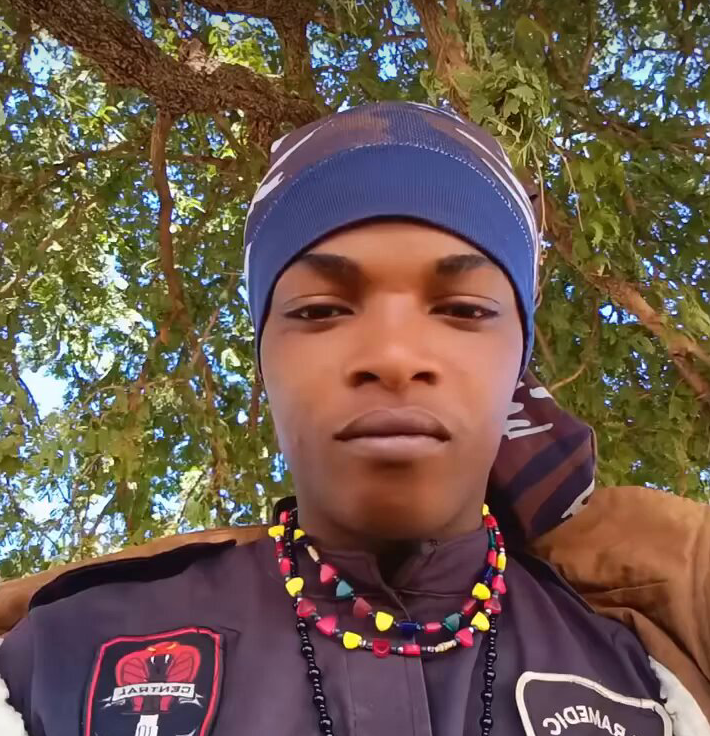
Terrorist’s Brazen Threat Sparks Nationwide Shock as Nigeria Confronts Alarming New Security Warning
Nigeria woke up to a chilling declaration that has since rippled through every corner of the country, reigniting old fears and opening new wounds. A terrorist, speaking with disturbing confidence in a recently circulated video, openly bragged about past kidnappings and issued a fresh threat that has shaken citizens and
Nigeria woke up to a chilling declaration that has since rippled through every corner of the country, reigniting old fears and opening new wounds. A terrorist, speaking with disturbing confidence in a recently circulated video, openly bragged about past kidnappings and issued a fresh threat that has shaken citizens and security analysts alike. His words—cold, direct, and laced with a taunting boldness—echoed like a declaration of open defiance against the state. “We kidnapped students in Kebbi and Niger State. We will soon start kidnapping soldiers and politicians; there is nothing the government can do about it,” he boasted, sending a jolt of alarm across a nation already stretched thin by insecurity.
The claim, unsettling as it is, comes at a time when Nigeria is still grappling with the trauma of years of mass abductions, from schoolchildren to commuters to villagers who vanish silently into forests that have become battlegrounds. In Kebbi and Niger States alone, dozens of families continue to live with the horror of unresolved kidnappings, their daily lives suspended between hope and despair. For the terrorist to not only acknowledge responsibility but to boast about it and promise more sends a loud message that the fight against insecurity remains far from over.
The severity of this threat lies not just in the words spoken but in the audacity behind them—a daring suggestion that the state’s security architecture is weak, penetrable, and easily mocked. For many Nigerians, this is not just a threat but a cruel reminder of the gaps that have allowed non-state actors to flourish. It highlights the deep fears shared across the country: that criminals have become too bold, too organised, and too dismissive of government warnings and military operations. Each time such a message surfaces, it chips away at public confidence, raising unsettling questions about how much control the authorities truly maintain over the nation\'s vast security challenges.
The mention of soldiers and politicians as new targets marks a worrying escalation. Historically, terrorists and armed groups have intentionally targeted vulnerable civilians—students, villagers, travellers—whose limited protection made them easy prey. A shift toward targeting uniformed personnel or political figures would represent a dangerous evolution in their operations. It signals not only increased confidence but also an attempt to directly challenge the state’s authority by striking at its symbolic pillars. Security experts warn that such statements should not be brushed off as mere bravado but treated as a serious operational threat requiring immediate intelligence action.
Across social media, outrage and fear grew in equal measure as the video spread. Many Nigerians expressed disbelief at how freely such individuals seem to operate. Others questioned how a man capable of such crimes could feel so comfortable issuing future threats without fear of swift consequences. For citizens already navigating daily anxiety—from highway banditry to urban kidnappings—this message only deepens the sense of vulnerability. Parents worry about their children; civil servants worry about their commutes; communities in rural belts fear the nightfall that often signals danger. The terrorist’s threat has found its way into living rooms, offices, buses, and marketplaces, becoming an uncomfortable topic that Nigerians cannot ignore.
Government officials, in response, have condemned the threat and assured Nigerians that security operatives are working tirelessly to dismantle such criminal networks. But citizens, still scarred by repeated attacks over the past decade, crave more than promises—they want visible results, arrests, and restored peace. Many believe that unless decisive action follows rapidly, such threats will only embolden more criminal elements who watch closely to see whether the state’s response is strong or weak. A country that hears threats from criminals too often eventually becomes numb to them, and experts warn that such numbness is dangerous. It fosters a sense of helplessness that can erode trust in institutions.
The comment that “there is nothing the government can do” is perhaps the most painful part for many Nigerians. It taps into a collective frustration that insecurity has remained stubbornly persistent despite billions spent on defence, despite changes in military leadership, despite repeated troop deployments. While the reality is far more complex than the terrorist suggests, such a statement acts as psychological warfare—an attempt to sow doubt, fear, and hopelessness among the populace while projecting strength on behalf of the criminal gang.
Communities in Kebbi and Niger are still counting losses from past attacks, recalling the nights when bandits stormed dormitories, forced terrified students into the bush, and demanded ransoms that devastated families. To hear that these same perpetrators are now planning to attack even more protected targets only adds salt to unhealed wounds. Teachers who lived through previous assaults worry that classrooms may become targets again. Parents who once trusted schools as safe spaces now carry lingering fear that another mass abduction could happen at any moment.
Security analysts argue that Nigeria must take this threat as an opportunity to reassess its strategy, strengthen intelligence gathering, improve collaboration between federal and state forces, and invest heavily in technology capable of monitoring vast remote terrains. Without these measures, criminals will continue to exploit the gaps. The idea that political leaders and soldiers—symbols of state power—might be targeted raises the stakes dramatically. It could force the government to adopt a more aggressive, coordinated counterterrorism strategy that leaves no room for these groups to regroup or issue further threats.
Meanwhile, ordinary Nigerians demand transparency, accountability, and urgent reforms. The era when criminals could boast publicly without immediate repercussions must end, citizens say. If the country is to regain full control, then its response to such threats must be swift, visible, and uncompromising. Failure to adequately address this new wave of threats could encourage additional groups to issue similar statements, believing that they can act with impunity.
As the nation debates, reflects, and watches closely, one thing remains clear: this threat has struck a nerve. It has exposed wounds that never fully healed and highlighted weaknesses that cannot be ignored. But it has also reignited conversations about resilience, unity, and the collective determination to resist fear. In moments like this, Nigeria has often found strength in its people—a shared refusal to be intimidated and a belief that no matter how loud the threats become, the country will not be defined by the voices of criminals.
The terrorist’s boast may have been meant to instill fear, but it has instead sharpened awareness. It has reminded Nigerians of the urgent need for bold, strategic reforms and reinforced the importance of a security system that protects every citizen, from students to soldiers to leaders. Whether the state’s response will silence this threat or embolden future ones remains to be seen, but one truth stands firm: Nigeria cannot afford to underestimate any warning issued by those who have already inflicted deep scars.
https://x.com/instablog9ja/status/1992960769382838558?t=vPHi4hYNj-ZLR_vma_ULAA&s=08
Share this post
Related Posts

Cornell Student Faces Deportation Amid Legal Battle Over Pro-Palestinian Protests
In a developing legal confrontation, Momodou Taal, a doctoral candidate in Africana Studies at Cornell...

“Pain Is With Me Every Day”: Morgan Freeman Battles Fibromyalgia with Courage and Grace
Hollywood icon Morgan Freeman, known for his deep voice, commanding screen presence, and decades-long legacy...

“She Said Yes — But the Internet Said Something Else Entirely: Proposal Photo Sparks Hilarious Debate
When Edgar Stuart Mugisha clicked the shutter on what he thought would be one of...